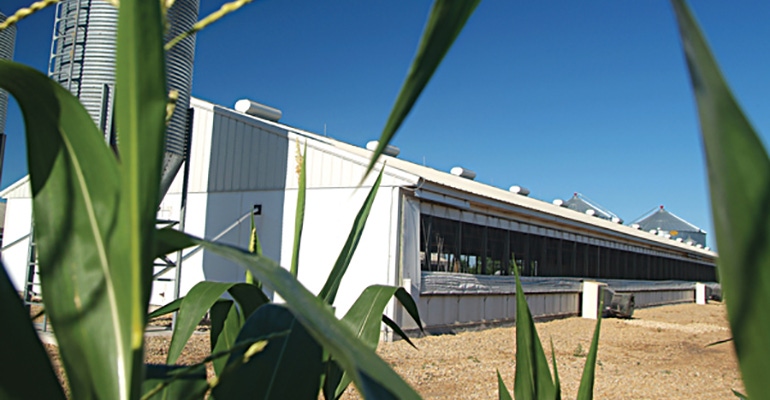Michigan invests more than $2.3 million in livestock research
Projects to address bovine respiratory disease, on-farm biosecurity and greenhouse gas emissions.
June 13, 2022

The Michigan Alliance for Animal Agriculture is investing more than $2.3 million in 26 new research and outreach projects in 2022. With support from the Michigan Legislature, the funding is available under the current fiscal year 2021-22 budget through the Michigan Department of Agriculture and Rural Development.
The M-AAA is a partnership among MDARD, animal agriculture industry groups and Michigan State University aimed at advancing the animal agriculture economy across the state.
"The agriculture sector in Michigan is facing uncertainties from a variety of sources," says George Smith, director of MSU AgBioResearch and a leader in the M-AAA. "Producers are faced with short-term issues such as rising input costs, while also dealing with long-term questions around sustainability and profitability. Our partners in the M-AAA are dedicated to helping producers find solutions that propel Michigan's animal agriculture industries into the future."
For this funding cycle, the projects cover a range of topics, including disease-related challenges and exploring ways to increase dairy profitability.
"We appreciate the opportunity to partner with MSU and provide input on critical research needs of the dairy industry," says Sheila Burkhardt, senior director of member and government relations for the Michigan Milk Producers Association. "The M-AAA-funded research projects allow us to be on the cutting edge, while providing solutions that will make a lasting impact on dairies throughout Michigan."
M-AAA projects are either one or two years in duration and are slotted into one of three categories: applied research, extension or seed funding. Researchers and outreach specialists are evaluated throughout the process and must submit progress reports and final summaries to M-AAA leaders.
Examples of 2022 projects include:
Angel Abuelo, an assistant professor of dairy cattle health and well-being in the Department of Large Animal Clinical Sciences, is studying the efficacy of vaccine boosters for newborn calves to better protect against illnesses such as bovine respiratory disease. Results from the project will inform vaccination strategies for improved calf health and will be shared through outreach programs with producers, herd consultants and veterinarians.
Elizabeth Ferry, a swine educator for MSU Extension, is generating educational resources to assist producers with biosecurity planning to prevent and respond to disease outbreaks. Producers deal with the threat of diseases in Michigan and beyond, from avian influenza to African swine fever. The project will support the development of an expert team to assist producers in preparedness for disease outbreaks, provide verification and tracking of biosecurity plans, and produce educational materials.
Jason Rowntree, the C.S. Mott Professor of Sustainable Agriculture in the Department of Animal Science, has led a 10-year adaptively managed grazing system for beef cattle at the Lake City Research Center in Lake City, Michigan. Beef cattle operations have been criticized for greenhouse gas emissions, and producers are looking at ways to reduce emissions moving forward. New M-AAA funding will help Rowntree intensively sample soils at the center in 2022, creating a soil carbon sequestration assessment combined with a carbon dioxide-based lifecycle assessment of all greenhouse gases emitted from the center’s beef operation. Rowntree hypothesizes that data will show this management results in a carbon sink or, at minimum, significantly reduced emissions.
Martin Chilvers, an associate professor in the Department of Plant, Soil and Microbial Sciences, is examining ways to control tar spot, a fungal disease of corn. The crop is often used as silage for animal feed. Tar spot thrives in humid and wet conditions and was limited to Central and South America prior to 2015, but the pathogen has since spread rapidly across the U.S. and Ontario, Canada.
Jeannine Schweihofer, a senior meat quality educator with MSU Extension, is evaluating wastewater management in small- to medium-sized meat processing facilities in Michigan. Wastewater from processing facilities is required to be treated in a way that protects water quality more broadly, and regulatory agencies have provided options to achieve this. However, there may be site-specific needs for each processing facility that make some methods more appropriate than others. For this project, Schweihofer is exploring alternative treatment and discharge techniques, developing a decision support tool for producers to determine which option is ideal for them, and identifying best practices for wastewater reduction and management.
"Part of MDARD's core mission is to protect public health, as well as the health of domestic animals, livestock and pets," says Gary McDowell, director of MDARD. "These grants help provide the necessary research and infrastructure needed to make sound decisions, improve operations and ensure an efficient and sustainable agriculture, as well as help our farmers navigate the current supply chain challenges."
Source: Michigan Alliance for Animal Agriculture, which is solely responsible for the information provided, and wholly owns the information. Informa Business Media and all its subsidiaries are not responsible for any of the content contained in this information asset.
You May Also Like


